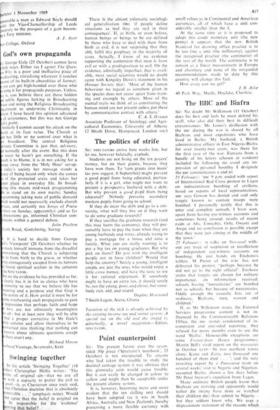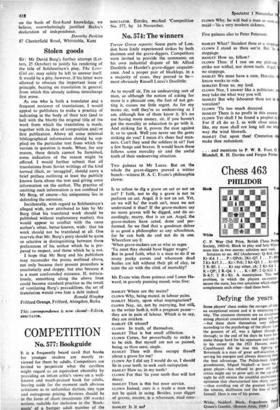The BBC and Biafra
Sir: No doubt Mr Wilkinson (11 October) does his best and feels he must defend his staff, who also did their best in difficult circumstances. Mr James's disillusion with the BBC during the war is shared by all Biafrans and most expatriates who have lived in Biafra. My husband, a British administrative officer in East Nigeria-Biafra for over twenty-two years, was there for the first year of the war. Extracts from a bundle of his letters (chosen at random) included the following ito avoid any im- pression of personal hostility I designate the use commentators A and ti):
23 February: 'BBC 9 p.m. ended with report of International Red Cross protest to Lagos on indiscriminate bombing of civilians, based on reports of local representatives. BBC says Gowon has denied and said only targets known to contain troops were bombed. I personally testify that this is utter and complete untruth. I have seen, apart from having eye-witness accounts and sometimes being around, results of recent raids at Aba, Umuahia, Orlu, Owerri and Awgu and no conclusion is possible except that they were just aiming at the middle of the town.'
25 February: 'n talks on Newsreel with- out any trace of scepticism or recollection of independent eye-witness accounts on bombing. He just hands on Enahoro's tablets. M Picrot of the !CRC has not delivered his protest. "perhaps because he did not go to the right official". Enahoro states that targets are chosen for military importance, on information received; schools having "mercenaries" are bombed not as "schools, but because of mercenaries. Oddly enough the casualty lists are of ordinary, Biafrans, men, women and children.'
If, as Mr Wilkinson states. the External Services programme content is not in- fluenced by the Commonwealth Relations Office, the RBC stands condemned of in- competent and one-sided reporting; they refused for many months even to use the word 'Biafra'. Honourable exceptions are some Twenty-four Hours programmes; Martin Bell's vivid report on the massacres in October EuPP-An two northern towns alone, Kano and Zaria, two thousand one hundred of them died . . . '; and the very revealing report by a Panorama team on several weeks' visit to Nigeria and Nigerian- occupied Biafra, shown a few days before Mr Peter Stewart's expulsion from Lagos.
Many ordinary British people know that Biafrans are starving and apparently would rather die (many have done or watched their children die) than submit to Nigeria— but they seldom know why. We urge a dispassionate statement of the reasons which
on the basis of first-hand knowledge, we believe, overwhelmingly justified Biafra's declaration of independence.
Dorothy Perkins
87 Chesterfield Road, Whitstable, Kent















































 Previous page
Previous page